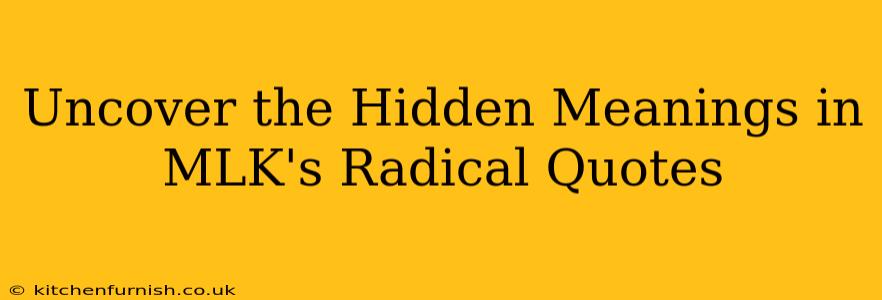Martin Luther King Jr.'s legacy extends far beyond his iconic "I Have a Dream" speech. His words, often deceptively simple, contained radical critiques of American society and potent calls for transformative change. This exploration delves into some of his most impactful quotes, uncovering the hidden layers of meaning that continue to resonate today. We'll examine not just what he said, but why he said it, and what it reveals about his vision for a truly just and equitable society.
"Injustice anywhere is a threat to justice everywhere."
This seemingly simple statement encapsulates King's profound understanding of interconnectedness. It wasn't merely a call for empathy; it was a strategic argument. By highlighting the universality of injustice, King connected the struggles of Black Americans in the Jim Crow South to the experiences of marginalized communities across the nation and the globe. He recognized that the fight for civil rights wasn't isolated but part of a larger global struggle for human dignity. This quote strategically broadened the movement's appeal, garnering support from unexpected allies who saw their own struggles reflected in his words.
What did MLK mean by this quote? Was he advocating for global activism?
While King's activism was deeply rooted in the American context, this quote reflects his broader worldview. He wasn't simply advocating for global activism in the traditional sense, but rather emphasizing the interconnected nature of injustice. Addressing injustice anywhere, he argued, was crucial to preventing its spread and entrenchment elsewhere. This philosophy fueled his involvement in anti-war movements and his growing critique of poverty and economic inequality. It highlights the systemic nature of oppression and the need for a holistic approach to social change.
"The ultimate measure of a man is not where he stands in moments of comfort and convenience, but where he stands at times of challenge and controversy."
This quote speaks to the true test of character. King wasn't interested in performative activism or convenient displays of morality. He recognized that true moral strength is revealed not in times of ease, but when facing adversity and opposition. This quote served as a call to action, urging individuals to move beyond passive acceptance and actively engage in the struggle for justice, even when it was personally difficult or unpopular. This challenges us to examine our own actions and motivations – are we standing up for what's right, even when it's difficult?
How can this quote be applied to modern-day challenges?
This quote remains remarkably relevant in today's world. From climate change activism to fighting social injustice, this quote challenges us to confront difficult issues and to examine our own responses to societal challenges. It is a call to courage and a reminder that our actions in the face of adversity define our character. Are we comfortable remaining silent in the face of injustice, or do we actively challenge the status quo, even if it means personal sacrifice?
"Darkness cannot drive out darkness; only light can do that. Hate cannot drive out hate; only love can do that."
This quote, often cited for its simplicity, carries a profound philosophical message. King wasn’t suggesting passive resistance to hate; rather, he was proposing a powerful strategy for overcoming it. He understood that responding to hate with more hate only perpetuates the cycle of violence and oppression. The "light" and "love" he spoke of weren't merely sentimental ideals; they represented active forces of justice, compassion, and transformative social action. This positive approach emphasized the power of empathy and understanding in dismantling systems of oppression.
What is the practical application of this concept?
The practical application of this philosophy lies in proactive and positive engagement with those holding opposing views. It involves seeking understanding, rather than resorting to condemnation or retaliatory actions. It's a call for constructive dialogue and a commitment to fostering empathy and mutual respect, even amidst disagreement. This requires courage, patience, and a willingness to engage in difficult conversations with the aim of promoting understanding and common ground.
Conclusion: The Enduring Relevance of King's Radicalism
Martin Luther King Jr.'s words weren't simply historical artifacts; they remain powerful and relevant today. By examining the underlying meanings of his seemingly straightforward quotes, we gain a deeper understanding of his visionary approach to social change and his commitment to a truly just and equitable world. His legacy is not just one of speeches and marches, but a profound challenge to confront injustice in all its forms, demanding that each of us rise to the occasion and stand on the side of justice, even when it’s difficult. His words continue to inspire activists and change-makers around the world to strive for a more just and peaceful future.

